Written By: Emmanuel Akumun, Center for Sustainable Transformation - CeST
Cities are referred to as the battleground for a sustainable future. The quotation “our struggle for global sustainability will be won or lost in the cities” is from the UN´s General Secretary Antonio Guterres. Currently, about 56% of the world's population, which accounts for approximately 4.4 billion individuals, resides in urban areas according to the World Bank. This urbanization trend is projected to persist, and by 2050, the urban population is anticipated to more than double its current size. At that time, nearly 7 out of 10 people will be living in cities. The future prosperity and well-being of our nation are closely tied to how we plan and develop our cities. This is recognized by Sustainable Development Goal 11: Sustainable Cities and Communities. This specific goal aims to "make cities and human settlements inclusive, safe, resilient, and sustainable." This underscores the prevailing understanding that the quality of human development is inextricably linked to the effective management of the cities in which we live. As we approach the last week of “Urban October”, the United Nations Human Settlements Program, UN-Habitat, and annual awareness month for the role of cities in development on this year’s theme; "Resilient Urban Economies: Cities as Drivers of Growth and Recovery," and as we stand on the threshold of the second half of the timeline set for achieving the SDGs, it serves as a timely reminder that it is now time to localize the SDGs, and make them relevant for the general public.
Having resided in one of the many neighborhoods in close proximity to some of Accra's most affluent residential areas - Cantonments and Labone -, next to La a traditional community for Accra’s ethnic groups Ga’s, it has become apparent that we may not be on track to building sustainable communities at a time when 58.62% of the country’s population resides in urban areas. This observation extends to several other settlements, particularly concerning how essential infrastructure such as drainage systems, sidewalks, sewage facilities, and buildings are designed and constructed.
“The African continent has the most rapid urbanization rate. You can even see it almost from week to week here in Accra how people are coming in.” Said Hilde Opoku, Program Manager, Ghana Smart SDG Cities Ghana at UN-Habitat. The UN agency within the UN, responsible for promoting sustainable urban development, improving living conditions in cities, ensuring access to adequate housing, and enhancing the overall quality of life for urban populations worldwide. Opoku said this while speaking on an episode of the weekly SDG-Hub program on Asaase Radio 99.5 hosted by the Center for Sustainable Transformation’s (CeST) youth-led program; Young Reporters for the Environment (YRE) in celebration of World Habitat Day and Urban October.

L-R: Hilde Opoku, Program Manager, Smart SDG Cities Ghana, UN-Habitat, Rosemary Balami, Co-host of the SDG-Hub & National Operator, YRE Ghana, Emmanuel Aboagye, Host, Energy 101, Asaase Radio 99.5. Photo: YRE - Ghana
Urbanization in Ghana
In recent decades, Ghana has experienced a significant shift in population from rural to urban areas. In 2022, the proportion of Ghana's population residing in urban areas held steady at approximately 58.62 percent marking an all-time peak, underscoring earlier projections that by 2050, 60% of Ghanaians will reside in urban areas. Cities such as Accra, Kumasi, and Tamale have expanded rapidly, drawing people in search of better economic opportunities and improved living conditions. This trend is expected to continue. However, as is often the case in many African cities, city planning rarely anticipates the needs of a growing urban population. This is evident in the numerous interchanges, particularly in Accra, that have been constructed over the years. These interchanges are often viewed as costly alternatives to demolishing existing structures to make way for new roads. Examples of this can be found on the Amasaman road to Kumasi, where dualization has resulted in the demolition of numerous houses. Similarly, on the Spintex-Palace Mall road where construction is ongoing, an additional lane could have been expanded, but instead, an improvisation was necessary to avoid demolishing a structure in its path.
“Accra is so many things. And some places are better than others. But we have a huge job in front of us. But I definitely think we can improve” said Opoku, when asked if she thinks Accra is on track to being a sustainable city.
In truth, urbanization in Ghana has not been all bad. In fact, in Accra for instance, it has given rise to so many housing and development projects that can be compared to some of the most developed or planned places in the world. Take for instance areas like Airport Residential, Ridge, and some parts of Cantonments. However, the population of people who live in these areas does not constitute up to 20% of those who live in the other areas that are not like them, and therein lies the challenge.
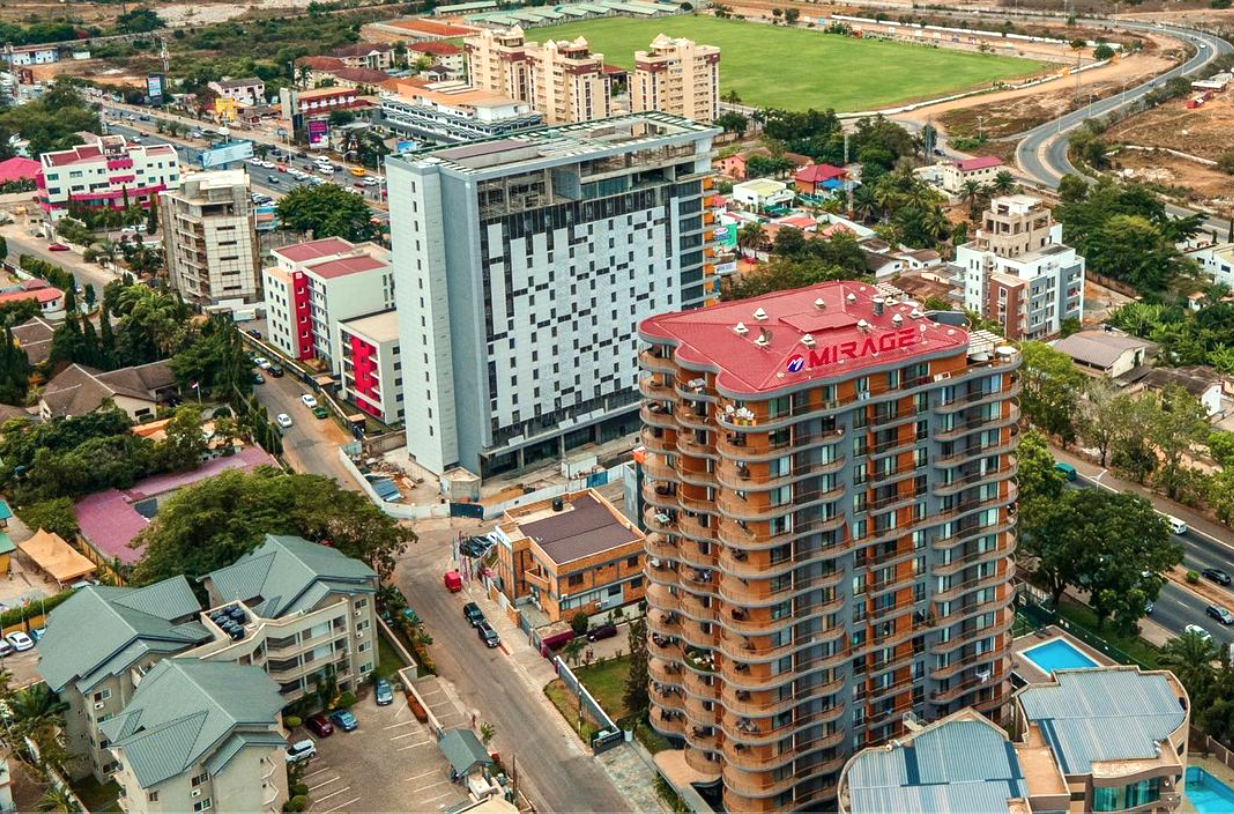
Image// Photo: ThisisAccra: Airport Residential, Accra.
It is worth noting that Ghana's 2022 Voluntary National Review (VNR) Report on implementing the SDGs reveals a significant increase in the population residing in slum areas. The population surged from 5.5 million in 2017 to 8.8 million in 2020, with a majority of the slums totaling 11 in the Greater Accra Region. This data underscores the fact that, with our expanding urban population, challenges related to affordable housing have become more pronounced, exacerbating the problems associated with poor urban planning in our cities.
The history of unsuccessful housing initiatives and government projects, combined with the high costs and financial burden of building a house, particularly for middle and low-income earners in Ghana, has given rise to a practice where individuals build structures that fall significantly short of sustainable standards. The urban housing scarcity and the associated expenses related to house construction have compelled some households to resort to makeshift structures like metal containers and kiosks as places to sleep, even on their own land.
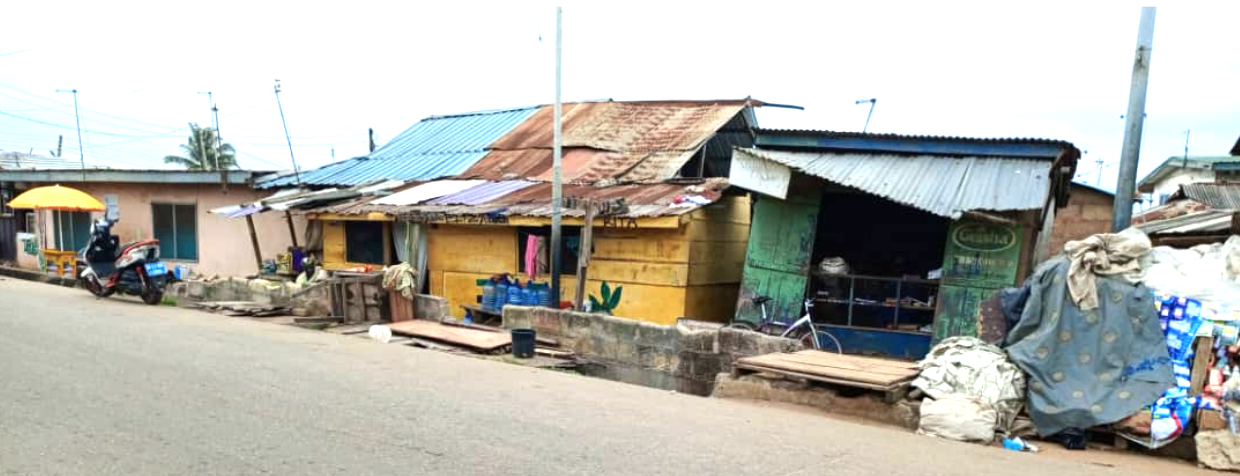
Image//YRE - Ghana: A makeshift house on indigenous land in La Community.
In the Nima neighborhood in Greater Accra for instance, close to 50,000 residents live crammed in homes made of scattered wood, concrete, and rusted iron roofing sheets. In many Ghanaian middle and low-income neighborhoods, houses are built without provisions for en suite bathrooms. According to The World, 1 in 5 people defecates openly, while only 1 in 7 households in Ghana have toilet facilities. Examples of poor planning of space are many, including parking spaces. The rapid increase in the number of cars in and around Accra over the past 20 years, as a result of the development of lands has reached a stage where the very idea of allocating space for parking seems like an extravagance beyond reach. This prevailing practice, which has gradually become the norm, has resulted in a scenario where pre-existing roads, initially constructed without consideration for sidewalks or cycling lanes, have further narrowed due to parked cars. At the same time, the current standard and public transportation routes do not provide a suitable alternative for most people. This highlights the glaring unsustainability of our urban planning and underscores the fact that our cities have not been designed with people's needs and convenience in mind.
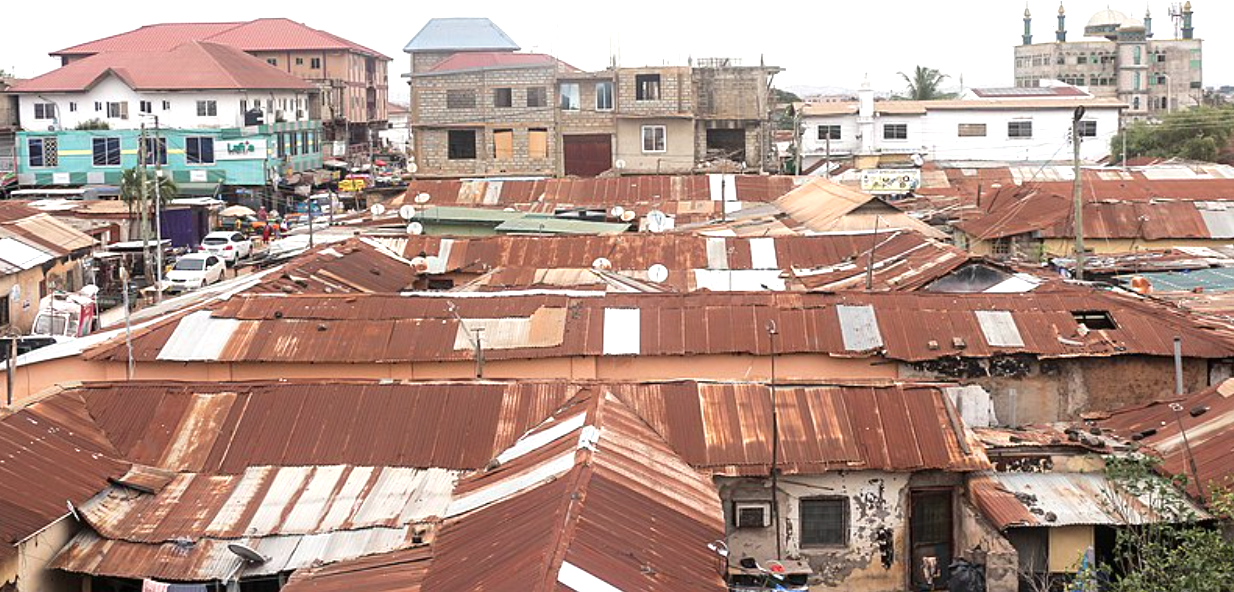
Image// Wikipedia: Aerial view of Nima
The Challenges of Rapid Urbanization
While urbanization can be a catalyst for economic growth and development, it also presents its fair share of challenges. The rapid influx of people into our cities often strains our infrastructure and resources, leading to overcrowding, inadequate housing, and increased pressure on basic services like water, sanitation, and healthcare ultimately leading to a high cost of living. And as it is with most African cities, dense with people doesn’t always mean dense with capital. These disparities underscore the reality that Africa is undergoing urbanization while grappling with significant poverty, often significantly poorer compared to other developing regions experiencing similar levels of urbanization. Over the past four decades, capital investment in Africa has typically averaged around 20 percent of its GDP. In contrast, countries in East Asia that underwent rapid urbanization, such as China, Japan, and the Republic of Korea, significantly increased their capital investment in infrastructure, housing, and office buildings during their urbanization phases. For instance, from 1980 to 2011, China's capital investment rose from 35 percent of GDP to 48 percent, coinciding with a substantial increase in its urban population from 18 percent to 52 percent between 1978 and 2012. In the broader East Asian context, capital investment remained consistently above 40 percent of GDP during this period, contributing to the region's remarkable economic density.
In Ghana, particularly in the capital city of Accra, the availability of land for real estate development has become increasingly scarce due to a surge in real estate investments. Consequently, indigenous landowners, who are either unwilling to sell their land, have retained small portions from previous sales, or possess limited land, to begin with, opt to develop their plots even if it means foregoing essential amenities such as toilets and bathrooms. As a result, it's quite common to find houses in typical Accra neighborhoods lacking en suite bathrooms, and this situation is mirrored in many other cities across different regions of the country.
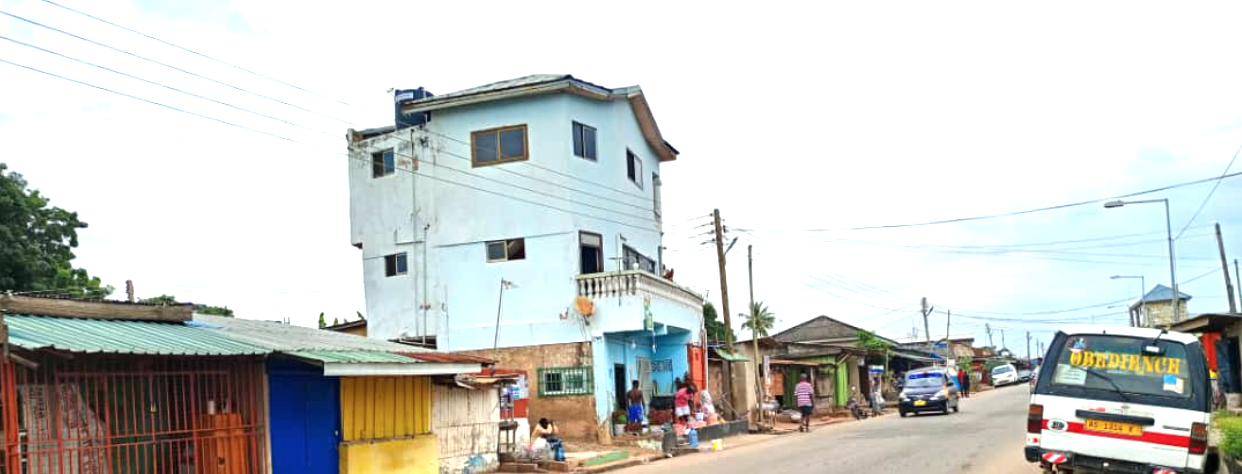
Image//YRE: Story building on La Wireless road, depicting how landowners maximize land use.
Unplanned urbanization on the scale we are currently seeing has led to the proliferation of sprawling slums, traffic congestion, increased pollution, and unequal access to opportunities and essential services, further exacerbating social and economic disparities. To steer clear of these pitfalls and ensure a prosperous future for all Ghanaians, it is imperative that we promptly embrace a sustainable approach to urban development. Already, the impacts of climate change, such as recurring flooding that has become distressingly common in many of our cities, have underscored the vulnerability and lack of resilience in our cities. Regardless of what part of the country you reside in, issues like inadequate drainage systems, compounded by the excessive presence of single-use plastics, are prevalent and demand urgent attention.
How do we Build Sustainable Cities?
Opoku emphasized that constructing sustainable cities in Ghana necessitates a multifaceted approach. This approach should encompass strategies that tackle essential elements of urban planning and development. Sustaining the increasing population densities in the country will necessitate investments not only in buildings but also in essential physical infrastructure. This includes roads, drainage systems, street lighting, electricity, water supply, functional sewerage, as well as crucial and effective services like policing, waste disposal, and healthcare. Without a corresponding increase in capital investment levels akin to those seen in Asian regions, Ghana’s cities run the risk of having their potential advantages overshadowed by issues such as disease and substandard living conditions.
“For [...]this year, it is [still] about recovering after COVID-19. We have felt it very strongly here in Accra, how the prices of things have gone up, the value of the Cedi has gone down, and how difficult it can be for many people to manage their daily lives now. But this is also a huge opportunity. Every crisis is actually a new beginning and a new opportunity. So this is our opportunity to build a sustainable green economy while we recover from the crisis that the COVID-19 pandemic put on us.” Opoku said.
In this context, it is timely that UN-Habitat Ghana, in collaboration with the Government of Ghana, more specifically the Ministry of Local Government District and Ministry of Finance, and the Government of Norway, is getting ready to launch the Ghana Smart SDG city program. SDG cities are UN Habitat's global flagship program and have come to Ghana to implement it in a network of cities. As the government emphasizes smart solutions and digitalization to improve public services, a smart component has been added to the Ghana model as well.
The program Is:
“I think the major thing is that we should work with nature and not against nature. Like with the downpours that you are talking about and resilience, we have to make natural sinks. We don’t have many green spaces where the rain can actually come. And also, we are building houses where rainwater naturally would pass through. So we really need to plan according to nature., not against nature. So urban planning plays a role.” said Opoku.
Let’s look at some of the components that need to be addressed from a sustainable city perspective:
Affordable and Adequate Housing: Access to affordable and decent housing is a fundamental human right and we must invest in it. However, successive regimes in the country have proven to not have the best track record with affordable housing projects and affordable housing solutions that cater to the needs of low and middle-income residents, reducing the proliferation of informal settlements and slums. In Accra, there has been a noticeable upsurge in construction activities, particularly in areas like Osu, Labone, Tse Addo, East Legon, Airport Residential, and Cantonments. However, a significant portion of these new developments predominantly comprises high-end luxury apartments, with a cost similar to what you find in the high-end neighborhoods in European cities, rendering them financially unattainable for the majority of the population. Besides the usual challenges of finding available apartments in Accra, the pricing of the ones you find often seems disproportionately high. Additionally, there persists a practice, though illegal, where tenants are required to pay two years' rent in advance, despite the government's amendment to the Rent Act of 1963 in 2020, which limits advance rent deposits to a maximum of six months.
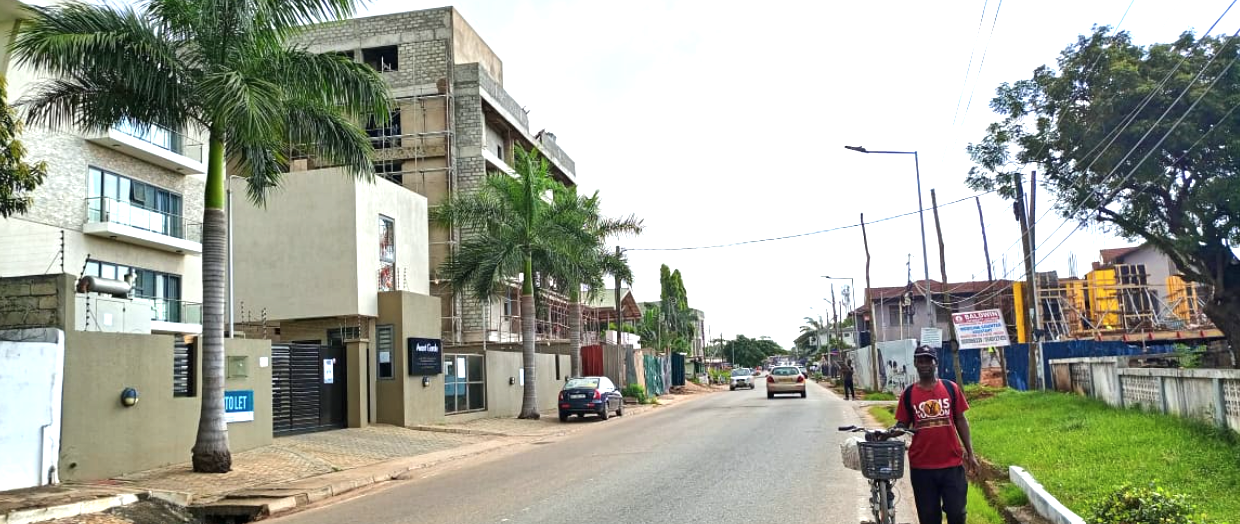

Image// YRE Ghana: Photo of old and new high-end luxury apartments under construction in Accra’s Labone.
Transportation: In Accra, a scenario frequently witnessed like in many other regional capitals across the country as well is the daily struggle of people during rush hours as they attempt to board vehicles for their daily commutes to and from work. Bus stops and lorry parks often serve as points for observing ordinary Ghanaians' challenges in their daily journeys from one place to another. Establishing efficient public transportation systems can help alleviate traffic congestion, reduce air pollution — especially now when air quality levels are a concern — and enhance mobility for all residents.
Improving transportation access requires a shift towards sustainable modes of transport that reduce Greenhouse Gas (GHG) emissions linked to transportation. Investments in sustainable transportation options, such as electric buses, electric trains, bike-friendly road infrastructure, and pedestrian-friendly amenities, can bring about a transformative shift in urban mobility. Furthermore, given the ongoing push for transitioning to greener energy sources, investments in electric vehicles and bicycles can play a substantial role in promoting sustainable transportation. In Accra, especially for those residing in areas like Madina, Kasoa, Pokuase, Dankuman, Lapaz, Spintex, Adenta, and Ablekuma, who work in places like Circle, Osu, Ridge, and Cantonments, it's not uncommon for people to close work at 5 pm and arrive home three or four hours later, exhausted and drained due to lengthy commutes as a result of traffic jams.
Investing in Sanitation and Waste Management Infrastructure: Investing in critical infrastructure, such as sanitation and waste management, is crucial to maintaining the cleanliness, health, and livability of our cities. Adequate infrastructure not only reduces the risk of disease outbreaks but also helps prevent environmental degradation. However, sanitation remains one of the most persistent challenges in our urban areas. This issue is compounded by a culture of excessive reliance on single-use plastics, which frequently end up in our open drainage systems, causing blockages and hindering the proper flow of water, ultimately contributing to the frequent flooding issues that have become all too common. In Ghana, the daily generation of solid waste amounts to approximately 12,710 tons, yet only a mere 10% of this waste is collected and properly disposed of at designated dumping sites. One of the central challenges in the management of solid waste in Ghana lies in the collection and disposal processes, which are both labor-intensive and frequently ineffective.
In many urban areas, the issue of proper solid waste disposal poses a significant challenge for local government authorities. City authorities and waste management companies frequently find themselves overwhelmed by the sheer volume of waste generated on a daily basis. One of the key reasons for the inadequate state of solid waste management, particularly at the municipal level in Ghana, is the absence of well-structured and efficient waste management strategies. It is estimated that municipal authorities allocate between 50% to 70% of their budgets to address the management and disposal of waste. Reports indicate that city authorities in Ghana spend approximately GHc 6.7 million (US$ 3.45 million) annually on waste collection and transportation for disposal, along with GHc 550,000.00 (US$ 0.28 million) per month for payments to waste contractors and landfill maintenance. The repercussions of poor sanitation, primarily stemming from indiscriminate waste disposal, are estimated to cost the country $290 million annually, equivalent to 1.6% of Ghana's Gross Domestic Product.
To establish effective waste management systems in our cities, it is imperative to engage various stakeholders, including government entities, waste management companies, and the local community, each playing a proactive role. Addressing these complex challenges necessitates a comprehensive approach, as these issues are intricately interconnected. To tackle this challenge effectively, multifaceted and multi-tiered interventions are indispensable. Additionally, conducting further research is essential to identify the most suitable strategies for involving urban residents in waste management, particularly in economically disadvantaged areas. To ensure solid waste management is both effective and efficient, it is recommended that interventions be implemented at the levels of local government, waste management companies, and the community.
Green Spaces: The preservation and establishment of green spaces within our urban areas are vital for enhancing the quality of life for all residents. Parks and recreational areas not only offer spaces for leisure and relaxation but also play a crucial role in promoting environmental sustainability. However, despite Ghana having seven national parks, its most densely populated, economically vibrant, and industrially-driven city, Accra, lacks a significant park with an extensive tree or forest cover. As the world grapples with the escalating climate crisis, the role of trees in mitigating the effects of greenhouse gases should be given increasing attention. Trees are not only vital for biodiversity and aesthetics but also serve as nature's carbon capture and storage systems. Understanding how trees store greenhouse gases is crucial for appreciating their significance in combating climate change. Moreover, trees act as natural air filters, thereby improving air quality. Additionally, trees provide shade and reduce surface temperatures in urban areas, helping to counteract the urban heat island effect. Cooler environments lead to decreased energy consumption for cooling, reducing greenhouse gas emissions.
Energy Efficiency: Promoting energy-efficient buildings and renewable energy sources can reduce the carbon footprint of our cities, mitigating climate change effects and reducing energy costs for residents and businesses. As a developing nation, Ghana requires energy solutions that address a range of developmental challenges tied to economic growth, environmental sustainability, and social equity. While significant barriers impede the widespread adoption of renewable energy (RE) sources, their environmentally friendly nature is undisputed. Ghana's energy emissions profile has surged due to the growth in electricity demand, which is estimated to have increased at a rate of 10% to 12% annually. According to the country's current Greenhouse Gas Inventory Report, the total greenhouse gas (GHG) emissions have reached 42.15 million tonnes (Mt) of CO2-equivalent (CO2e). Within these emissions, the energy sector accounts for the second-largest share, contributing approximately 15.02 MtCO2e.
Due to Ghana's developmental aspirations, the current per capita electricity consumption of 534 kWh per year is projected to reach 5000 kWh per year by 2030. Over the past fifteen years, Ghana has grappled with the challenge of establishing sustainable electricity generation to guarantee a more dependable power supply. Despite increasing the installed power generation capacity more than threefold over the last thirty years, the country experienced significant production losses during the 2015 power crisis, averaging approximately US$ 2.1 million per day (or US$ 55.8 million per month). In the effort to address this pressing issue, Ghana, as a developing economy, allocates a substantial portion of its GDP, nearly 27% of the country's total export earnings, to the importation of fossil fuels. This dependence on fossil fuels stands in contrast to the abundant low-carbon energy resources, such as renewables, that are readily available within the country's reach.
The advantages of developing and utilizing renewable energy are significant and have far-reaching implications for the sustainability of our planet. One of the primary benefits is the cost-saving advantage. Renewable energy sources like solar and wind power can lead to substantial cost savings over time. Renewable energy (RE) sources in Ghana can and must emerge as a crucial alternative to future challenges in achieving sustainable energy solutions within a low-carbon economy, particularly in light of the heightened global calls for a complete phaseout of fossil fuels. However, realizing this potential requires a united national effort to implement RE policies. For the sake of our cities and our shared future, the time for action must be now.
Investing in Green Startups: Encouraging diverse economic activities, supporting local businesses, and investing in green startups are essential for inclusive urban growth. Empowering residents economically can reduce poverty and inequality. As previously mentioned, a common challenge in many African cities is that high population density does not necessarily translate into economic opportunities or capital. However, we are currently in an era where the race to a greener future has sparked a surge in the number of sustainable entrepreneurs, many of whom are young. In a country like Ghana, where the rising youth unemployment rate is a concern, this presents an opportunity for the government to invest in some of these impact-driven eco-inclusive Micro, Small, and Medium Enterprises (MSMEs) operating in sectors like waste management, cleaner cooking energy alternatives, and Agri-processing. These enterprises are vital in generating positive environmental and social impacts while contributing to economic growth. For this industry to flourish on a scale where its impact is truly transformative, it requires support from both the government and the private sector.
The Main Challenge to Move Forward at the Local Level
When asked what some of the challenges the country faces in its quest to build sustainable cities are, Opoku said;
“One of the challenges here which is different from many other countries is that we haven’t empowered the cities to make decisions on their own, or to even make investments and budgeting decisions for themselves. That is a challenge in itself and I am saying that because it makes it difficult for the cities to be a driver of the change that we are talking about.”
The theme for this year's Urban October "Resilient Urban Economies: Cities as Drivers of Growth and Recovery," serves as a crucial reminder that the destiny of our nation is intricately linked to our cities. To harness the abundant opportunities within our urban centers, we must adopt a proactive approach to planning and executing city initiatives with a forward-looking perspective. While striving for economic growth and infrastructure advancement, we must exercise caution not to sacrifice the sustainability and livability of our cities in the process.
“It has to be. But of course, it takes time. And I think the most crucial thing is always planning and financing. But everything that human beings have set out to do is possible. I mean, we went to the moon” said Opoku when asked if the mandate of the UN Habitat in ensuring that people have adequate shelter and places to live is achievable.
Like many other nations, we are currently experiencing a profound urban transformation. To harness the benefits of it while mitigating its challenges, we must prioritize sustainable city planning and development. By focusing on affordable housing, renewable energy-efficient transportation, sustainable infrastructure, green spaces, renewable energy, and investing in green startups, we can build cities across the country that not only accommodate our growing population but also serve as engines of growth, development, and well-being for all citizens. Sustainable cities are not just a vision; they are a necessity for Ghana's future prosperity.